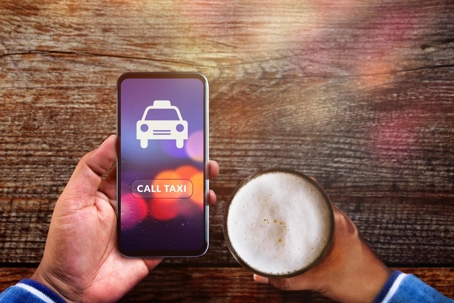Throughout the years, we’ve discussed the different things that a person can do to prevent themselves or others from driving drunk. Amongst them, you’ve heard me mention personal breathalyzers that a person can purchase to help them gauge whether they or someone else should be getting behind the wheel. More convenient and affordable than an actual breathalyzer for the average consumer might be a breathalyzer attachment to a smartphone, which are becoming increasingly popular.
Well, smartphones may no longer even need the breathalyzer attachment to tell someone that they’re too drunk to drive using the accelerometer that is embedded in most smartphones.
According to a study published on August 18th in the Journal of Alcohol and Drugs, smartphones may help predict when a person is too drunk to drive by measuring changes in walking patterns.
Researchers from the University of Pittsburg provided enough alcohol to volunteer participants to raise their blood alcohol content levels to approximately 0.20 percent, and asked them to drink it in an hour or less.
In addition to being well over the legal limit of 0.08 percent in all states but Utah (where the legal limit is 0.05 percent), most individuals would be experiencing the telltale signs of intoxication; disorientation, loss of coordination, dizziness, and trouble walking or standing.
The researchers then monitored the volunteers over the next seven hours to take measurements of their respective blood alcohol content levels every half hour, and have them walk 10 steps in a line then turn around every hour. During this time, smartphones were affixed to the participants’ lower back to measure specific bodily movements.
Based on the measurements recorded on the cellphone, the researchers were able to predict, with 90 percent accuracy, when the blood alcohol concentration for a participant was over the legal limit of 0.08 percent.
Lead researcher Brian Suffoletto, now at Stanford University, acknowledged that the next step is to determine if it is still possible to make the same predictions when participants’ phones are in their hand or in their pocket, the places people most often keep their phones, not lower back.
“Despite these limitations, this proof-of-concept study provides a foundation for future research on using smartphones to remotely detect alcohol-related impairments,” said Suffoleto.
“I lost a close friend to a drinking and driving crash in college,” said Suffoletto in a press release. “And as an emergency physician, I have taken care of scores of adults with injuries related to acute alcohol intoxication. Because of this, I have dedicated the past 10 years to testing digital interventions to prevent deaths and injury related to excessive alcohol consumption.”
One could see the possibilities in drunk driving prevention. With further research and development of apps that are based on what this study is suggesting, it may be possible to soon have an app that, quite literally, will tell you that you are too drunk to drive.
The post Can a Phone Predict Whether a Person is Too Drunk to Drive? appeared first on Law Offices of Taylor and Taylor - DUI Central.





